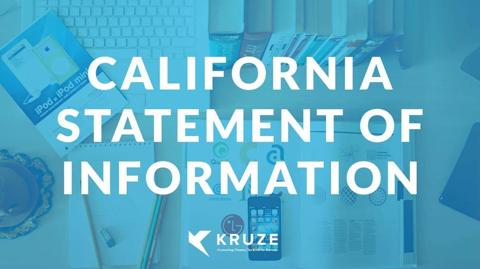
Running a startup keeps founders pretty busy, but as 2024 comes to a close, it’s important for you to get your records in order and get ready for 2025. You should prepare for your tax and compliance deadlines, including taking advantage of tax incentives available to VC-funded startups. You’ll also want to update (or create) your financial plan for 2025 to help you allocate resources and prioritize your spending.
2025 Startup Checklist for Tax Year 2024
- If you got an ERC/ERTC (Employee Retention Tax Credit) figure out if you accidentally committed tax fraud.
- Assemble your documentation for research and development expenditures for the R&D tax credit.
- Review the 2025 tax deadlines and make sure your documentation is ready.
- Send your contractors their Form 1099s before January 31.
- Check with your payroll provider to make sure your employees will receive W-2s.
- Finalize all your 2024 financial statements.
- Conduct employee reviews and distribute employee bonuses.
- Review your capitalization table.
- Update or create your financial model.
- Present your plan to your board of directors for approval.
- Review your financial performance against your metrics and assumptions.
Tax Checklist
Review your Employee Retention Tax Credit (ERTC). This is a legitimate tax credit that some startups can claim - but many founders may have been misled by sketchy tax ‘advisory’ firms claiming that they were owed a big check from the IRS. Many of these claims will turn out to have been made in error - and that means that the startup - and their founders - may be in tax trouble. If you got one of these claims, ask your CPA to review it asap!
A startup can still retroactively claim the ERTC for wages paid between June 30, 2021 and January 1, 2022 by filing amended payroll tax returns for tax years 2020 and 2021. The ERTC is a refundable credit that businesses with 500 or fewer employees can claim on qualified wages paid to employees, and some qualified health insurance costs. Created under the Coronavirus Aid, Relief, and Economic Security (CARES) Act, the ERTC has been adjusted several times by legislation. Employers can still claim the ERTC retroactively by filing Form 941-X for up to three years after the original payroll taxes were due, which means the 2020 ERTC can be claimed until April 15, 2025, and the 2021 ERTC can be claimed until April 15, 2025. The ERC falls into two categories:
- Revenue declines or company shutdown. The credit applies to businesses that were fully or partially suspended, had to reduce business hours, or saw a significant decline in revenue. The criteria have shifted (the credit has been removed for Q4 2021) but in general, this credit is a percentage of wages paid during specific time frames.
- Recovery startup business. Startups founded after February 15, 2020 may be able to claim the ERTC for the third and fourth quarters of 2021. This credit could total $100,000 ($50,000 per quarter). You’ll need to submit amended quarterly tax payroll filings, and we have more information about claiming this credit.
The IRS has issued warnings about Employee Retention Tax Credit scams. While the credit is real, aggressive marketers are misrepresenting and exaggerating which businesses can qualify for the tax credits. There are very specific requirements for organizations that apply for the credit. Startups that improperly file for this credit can face action from the IRS, including repaying the amount plus penalties and interest. Any company considering filing for the ERTC should consult a trusted tax professional before taking any action.
Collect documentation for your R&D tax credit. The R&D tax credit provides an incentive for companies to invest in research and development by providing tax credits for R&D spending. The spending has to meet certain criteria to claim the credit, but the credit can be worth up to $500,000 in 2023. For years beginning before 2022, your startup can take a current deduction if you haven’t claimed any eligible deductions and you file an amended return. Starting in 2022, the deduction must be amortized over five years (15 years for research outside the US). Qualified research expenses (QREs) include designing or developing new products, enhancing existing products, and developing or improving prototypes and software. Your Kruze Consulting accountant can work with you to determine your eligibility, and to help you assemble information like payroll records for employees involved in R&D; receipts for equipment purchases; contracts for third-party R&D partners; and blueprints, designs, patents, or project notes.
NOTE: Section 174 of the tax code governs how startups may deduct qualified research and development expenses on their tax returns, and it was changed in 2022. Startups can no longer deduct 100% of their R&D expenses from their taxable income in the year those expenses occurred. Instead, the expenses have to be amortized over five years (15 years for research outside the US). That means startups will have higher tax bills. If your startup has been spending large amounts on R&D and previously paid no income tax, you may find that you now have a tax obligation.
Confirm your filing deadlines and prepare your tax documents. Even early-stage companies have tax and regulatory requirements, and it’s important to stay in compliance. Penalties and paperwork can pull your attention away from running your business, and you’ll want to be ready for any due diligence. We provide information on tax deadlines for C-Corp startups to help you make sure you don’t miss important dates.
File 1099 forms for contractors. Anyone who provided services to your business that were worth at least $600 must receive a Form 1099-NEC by January 31, 2025. NEC stands for non-employee compensation, and 1099-NECs are sent to contractors, freelancers, attorneys, landlords, and other self-employed individuals.
Prepare to file W-2s. In general, your payroll provider will handle the basics of filing your W-2s. They have the necessary information, including total compensation, Social Security and Medicare wages, and withholding amounts, as well as retirement plans and health coverage. However, if you or your employees have received or purchased stock options, there are additional filing requirements.
PPP loan forgiveness (if you haven’t done so already). Paycheck Protection Program (PPP) loans may be fully forgiven if you spent your funds properly in a specific time period. You will need to apply for forgiveness directly from your lender for loans of more than $150,000 and through the online SBA PPP Direct Forgiveness portal for loans of $150,000 or less. Completing the forgiveness application can be complicated, and your Kruze Consulting accountant can help you navigate the process.
Financials Checklist
Finalize your 2024 financial statements. With any business, it’s important to close out your books for one year to get ready for the next. With startups, it’s critical to review your financial position with your investors and/or board of directors, both to increase their confidence in your startup and make sure there are no surprises in store for them later. As part of this process, you’ll need to:
- Record all financial transactions. This includes banking and credit card transactions. Make sure you close out outstanding accounts receivable, and do everything you can to collect on unpaid bills. If you have bad debt you’ll want to be able to write it off, so record your collection efforts.
- Reconcile your balance sheet. Your balance sheet shows your company’s financial position at a specific point in time. You’ll want to review things like total cash, accounts receivable, inventory (if applicable), any depreciation for fixed assets, and your capitalization table (more on that below).
- Review your income statement. Your income statement shows your performance over time. You should verify revenue and expenses, and use those to reach your net income. That’s what you’re going to pay taxes on.
Issue employee bonuses. Year-end reviews help employees reflect on the previous year and prepare for the upcoming year, though other times of the year may be more appropriate for some businesses, depending on when managers and employees have time to devote to reviews. If your reviews are scheduled for year-end and tied to bonuses, consider conducting them as early as possible to reduce year-end stress on your employees.
Reconcile your capitalization table. Your cap table is just as important as your balance sheet. Cap tables evolve over time, and should be updated every time an equity event occurs so that information isn’t overlooked and additions, deletions, and adjustments are recorded accurately. A year-end cap table review helps to make sure the information in the cap table matches your transactional documents.
Build or update your financial model/budget. Your financial model should include key metrics and assumptions that you’ll use to run your business. If you don’t have a financial model, you should create one. Your financial model is the numeric representation of your business strategy, and you should consider:
- Constraints. Growth targets are important, but so is not spending too much. Project budgets can get strained by unexpected scope increases or costs, so it’s important to know how much wiggle room you have for expenditures. By starting with your spending constraints, you eliminate a lot of the budget iterations, where you may be asked to hit the same revenue targets but spend significantly less.
- Margins. How much do you expect to earn? Larger margins could increase your runway.
- Human capital. What will your team need to look like to achieve your goals? Finding the right people and managing their focus and productivity is a critical priority.
- Go-to-market strategy. You’ll need customers for your product or service, which means creating marketing and sales plans, and budgeting for the associated expenses.
Get board approval for your plan. Getting your financial plan finalized and approved by the board of directors in December or January lets you start the year with established targets and milestones. You’ll also be able to start recruiting at the beginning of the year. Many startups find themselves missing milestones later in the year because they didn’t staff correctly early in the year.
Review financial performance. If you have a financial model, you need to review the metrics and assumptions to see how you performed against them to see what changes you need to make for the upcoming year. This review should include:
- Check your budget against actuals. Proposed budgets rarely match the actual numbers, and a budget variance analysis will allow you to adjust your budget for next year, see areas to increase income or reduce expenses, and determine if you may need to seek additional financing.
Incorporate yourfundraising strategy. Ideally, you should have 18 months of cash on hand or a definite fundraising date. You’ll need to review your milestones and fundraising goals.
Checking items off your
end-of-year list
In addition to all the tasks outlined in our end of the year checklist, there may be other things you need to address based on your particular business needs or processes. Kruze Consulting can help you conduct your year-end review and work with you to get your startup off to a great start in the new year. If you have questions about any of the things you need to do before year-end, please contact us.















